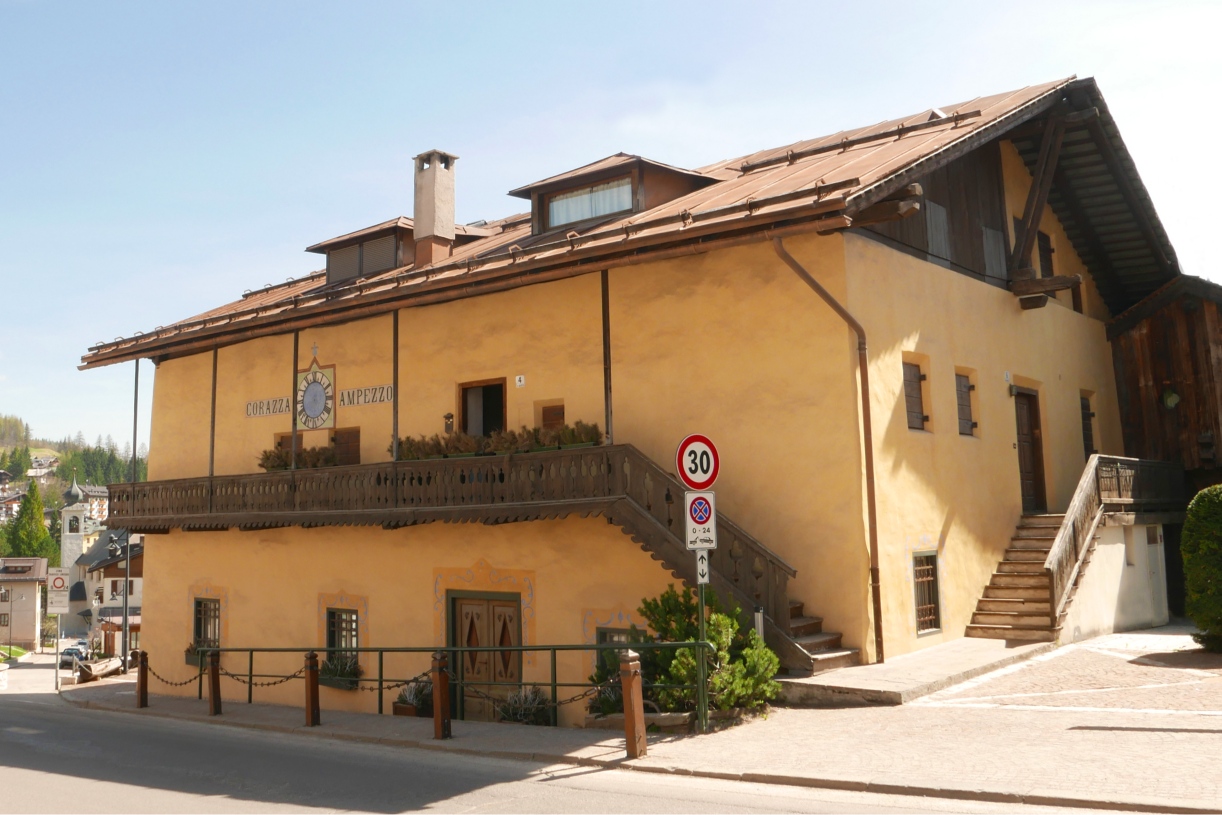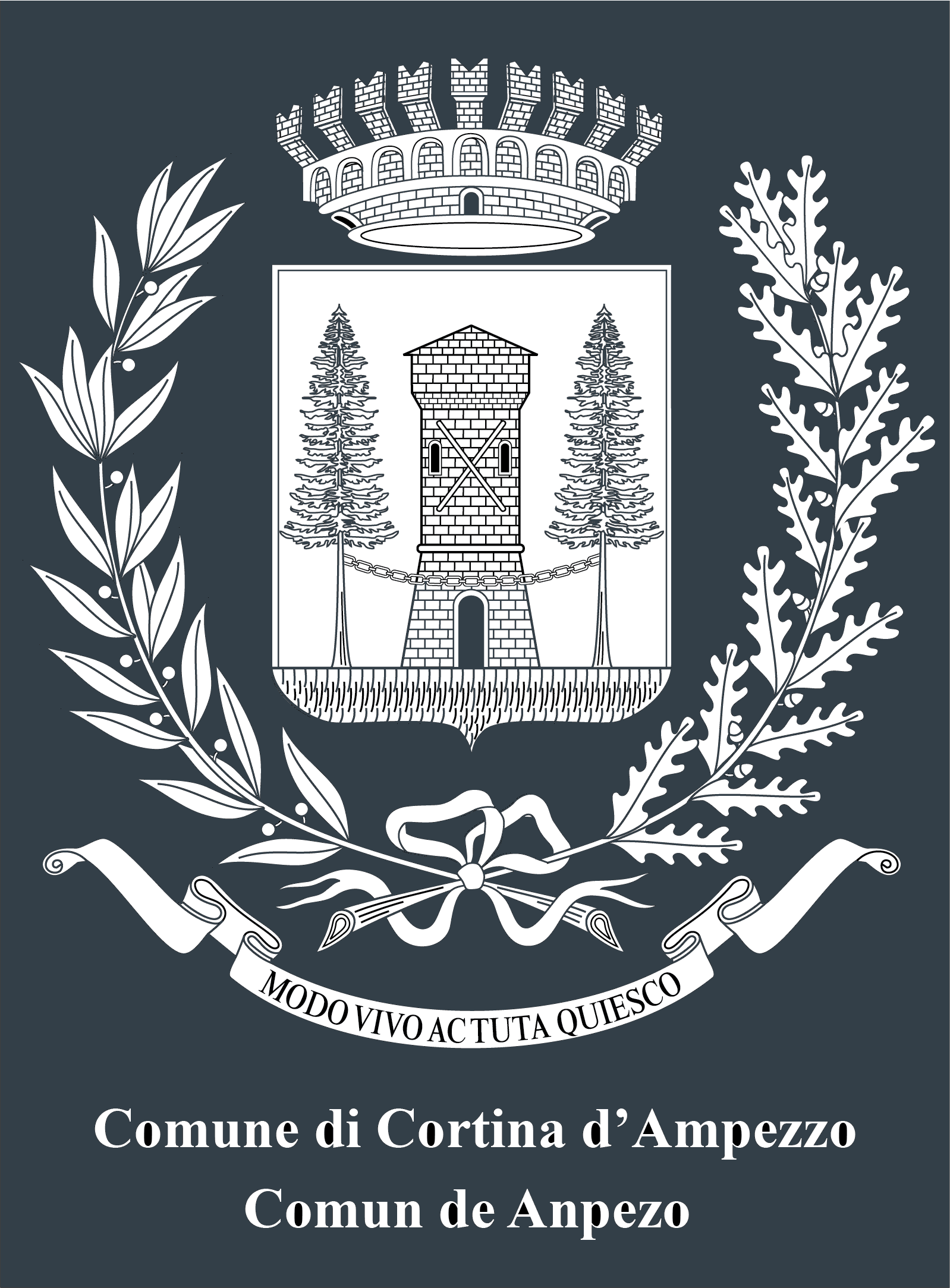
Right at the entrance to Via della Difesa in the centre you’ll come across one of the most characteristic buildings in Cortina: Casa Corazza.
A large clock on the wall marks the hours and recalls the profession of its original owners: in fact, here there once was a workshop for the construction and repair of wall clocks.
The “Corazza Ampezzo” sign, which still appears on the wall today, refers to the nickname of the “Dibetto”, a family of Ampezzo natives who specialised first in forging armour, then as blacksmiths and finally as watchmakers.
The balcony of the house ends with a small wooden hand, indicating a direction that leaves room for interpretation: towards the nearby church of San Francesco or the cemetery perhaps?

Right at the entrance to Via della Difesa in the centre you’ll come across one of the most characteristic buildings in Cortina: Casa Corazza.
A large clock on the wall marks the hours and recalls the profession of its original owners: in fact, here there once was a workshop for the construction and repair of wall clocks.
The “Corazza Ampezzo” sign, which still appears on the wall today, refers to the nickname of the “Dibetto”, a family of Ampezzo natives who specialised first in forging armour, then as blacksmiths and finally as watchmakers.
The balcony of the house ends with a small wooden hand, indicating a direction that leaves room for interpretation: towards the nearby church of San Francesco or the cemetery perhaps?

Right at the entrance to Via della Difesa in the centre you’ll come across one of the most characteristic buildings in Cortina: Casa Corazza.
A large clock on the wall marks the hours and recalls the profession of its original owners: in fact, here there once was a workshop for the construction and repair of wall clocks.
The “Corazza Ampezzo” sign, which still appears on the wall today, refers to the nickname of the “Dibetto”, a family of Ampezzo natives who specialised first in forging armour, then as blacksmiths and finally as watchmakers.
The balcony of the house ends with a small wooden hand, indicating a direction that leaves room for interpretation: towards the nearby church of San Francesco or the cemetery perhaps?

Right at the entrance to Via della Difesa in the centre you’ll come across one of the most characteristic buildings in Cortina: Casa Corazza.
A large clock on the wall marks the hours and recalls the profession of its original owners: in fact, here there once was a workshop for the construction and repair of wall clocks.
The “Corazza Ampezzo” sign, which still appears on the wall today, refers to the nickname of the “Dibetto”, a family of Ampezzo natives who specialised first in forging armour, then as blacksmiths and finally as watchmakers.
The balcony of the house ends with a small wooden hand, indicating a direction that leaves room for interpretation: towards the nearby church of San Francesco or the cemetery perhaps?

Right at the entrance to Via della Difesa in the centre you’ll come across one of the most characteristic buildings in Cortina: Casa Corazza.
A large clock on the wall marks the hours and recalls the profession of its original owners: in fact, here there once was a workshop for the construction and repair of wall clocks.
The “Corazza Ampezzo” sign, which still appears on the wall today, refers to the nickname of the “Dibetto”, a family of Ampezzo natives who specialised first in forging armour, then as blacksmiths and finally as watchmakers.
The balcony of the house ends with a small wooden hand, indicating a direction that leaves room for interpretation: towards the nearby church of San Francesco or the cemetery perhaps?





Head Office: Loc. Sacus 4, 32043 Cortina d’Ampezzo (BL) – P.I. 00806650255 | Privacy Policy – Cookie Policy
The Cortina Skyline is back!
Starting December 23, 2025, the lift system connecting Tofane, 5 Torri, and Falzarego will be back in operation.
A spectacular journey among the peaks, made possible by the synergy between Servizi Ampezzo S.r.l. and ISTA S.p.A.
Ready to touch the sky?